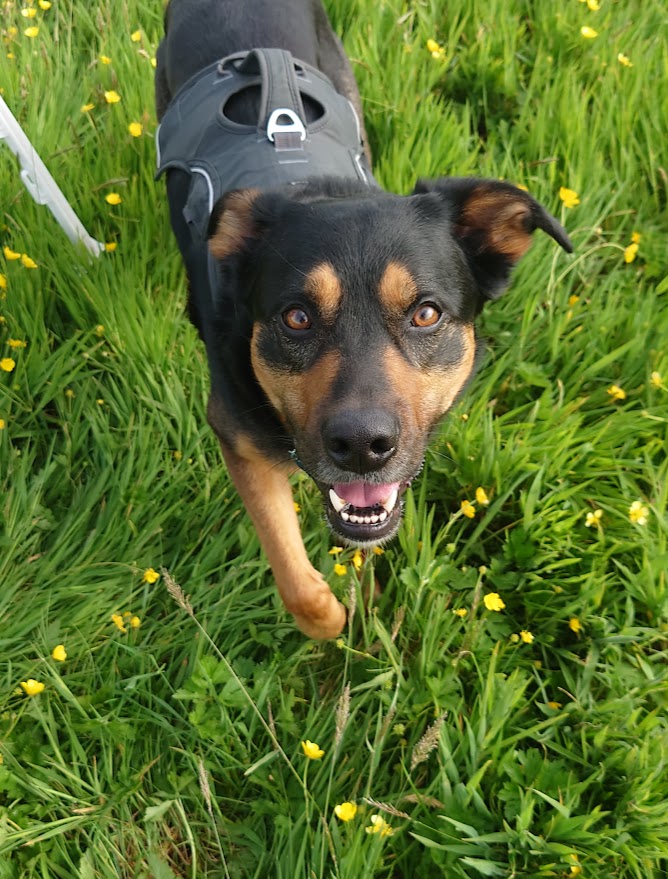Call / 07815 167247
Email [email protected]
Call / 07815 167247
Email [email protected]
One of the most common questions I get asked is, "How much will it cost?"

The fact is, we can't shy away from the realisation that transformations take time, effort, energy, sacrifices ... and yes, often money. However, the cost of NOT doing something is often greater. The pictures above show Jess when she was in rescue in 2015 and a pic taken at some point last year. She went from a shy, cautious and sometimes frightened little girl to a confident, still sometimes cautious, but friendly character. That didn't come from sitting back and hoping things might improve. It came about because of the investment we took in helping her be the best dog she can be.
Here’s some thoughts on cost, investing in your dog, the cost of not doing something, and some of the questions I have been asked over the years.
Here's how I often explain pricing.
Think of it like learning to drive. I can certainly tell you the cost of each lesson, but just as with driving, it's tough to predict how many sessions you'll need to become a confident "dog parent." In some cases there are many variables and influences, and it might mean embarking on a comprehensive program of sessions to address your dog's behaviour and training.
Some people are great at picking things up, have done some good foundations already, have great empathy with their dog. Whereas others will have no experience and have never had a dog before. And some may have drawn conclusions about what they think is wrong and may not be addressing the right problem.
So, to answer the question “How much will it cost?” The answer must always be, “It depends.” I can tell you how much my time costs. I can estimate using past experiences, but I can’t give you a definitive answer on how many sessions it will take to make the changes that you and your dog need.

Free training that you can grab online or on the TV can be okay, but it is often unrealistic. Listening to friends and family may be useful, but it may also take you down the “It worked for my dog” route which may be wrong for YOUR dog.
If we go back to the learning to drive example. A friend or a family member could teach you for free, if you don’t fall out with them you will hopefully learn some good skills, but that may come along with all their bad habits they have picked up over the past 20 years. Awkward!
I had a wonderful comment from a client recently who said that she probably could have found out about the things we discussed, but would not have been sure what advice was right. Working with me meant that she got what was right for her and her dog, she had accountability, and progress was rapid.
So now let’s look at things from a different perspective.

Now, I am not just talking about financial, but I will touch on that. What I am talking about here are the emotional, time, social and quality of life costs that might come if your dog has some training or behaviour issues.
Stress and Anxiety: Dealing with a problem dog can be emotionally draining and stressful for both you and your family. It can affect your mental health and overall well-being, leading to increased stress and anxiety levels. The problem can cause embarrassment amongst family, friends and neighbours. No-one enjoys walking down the street being told ‘your dog needs training’.
Guilt and Frustration: You may experience feelings of guilt or frustration when your dog's behaviour causes issues or harm, you may feel disappointed that you can’t do the things that you expected to do with your dog.
Strained Relationships: Problem behaviours can strain relationships with family members, neighbours, or friends, leading to emotional strain.
Time and energy: You may be spending time reading, scrolling chatting to try to learn about dog behaviour and training techniques. This takes time and effort. As I touched on earlier, you may have tried lots of different trainers, classes and workshops but feel you have not got anywhere with your dog.
Isolation and restrictions: Problem behaviours can disrupt your daily routines and activities. Problem behaviours such as aggression or extreme fear may limit your dog's ability to socialize with other dogs or people, leading to isolation. You may need to limit your dog's activities or interactions due to their issues, affecting your social life. You might have to avoid long walks on the beach because your dog won’t come back when called or gets frustrated around other dogs on the lead. You might have to forego holidays or travel plans due to your dog's behaviour issues. Owning a problem dog can reduce the overall enjoyment of having a pet.
And finally financial costs: We have all been there, putting aside employing a professional trainer to help you, the costs can mount up:

Oh gosh, I feel a bit of a downer now, but let me tell you IT DOES NOT HAVE TO BE THAT WAY.
Here’s the thing, seeking professional help when needed can a mitigate a lot of these costs. many behaviour and training problems can be successfully prevented or addressed with training and patience. My point is, by getting help you will likely be saving financially and emotionally, and be able to lead a happier life with your dog.
Because the issues some dogs face can become quite costly on their own if left unaddressed. It's like getting regular car maintenance; it can save you from a breakdown later on.
When it comes to understanding the cost of positive change in your dog's behaviour and training, investing in professional help for your dog's behaviour and training issues can save you from emotional, social, and financial costs down the road. It's like preventive maintenance for your dog's well-being and your own peace of mind.
So, when you ask, "How much will it cost?" remember that the true cost of not seeking help may be far greater.
By addressing the issues now, you're not only investing in your dog's future but also in a happier and more harmonious life together.